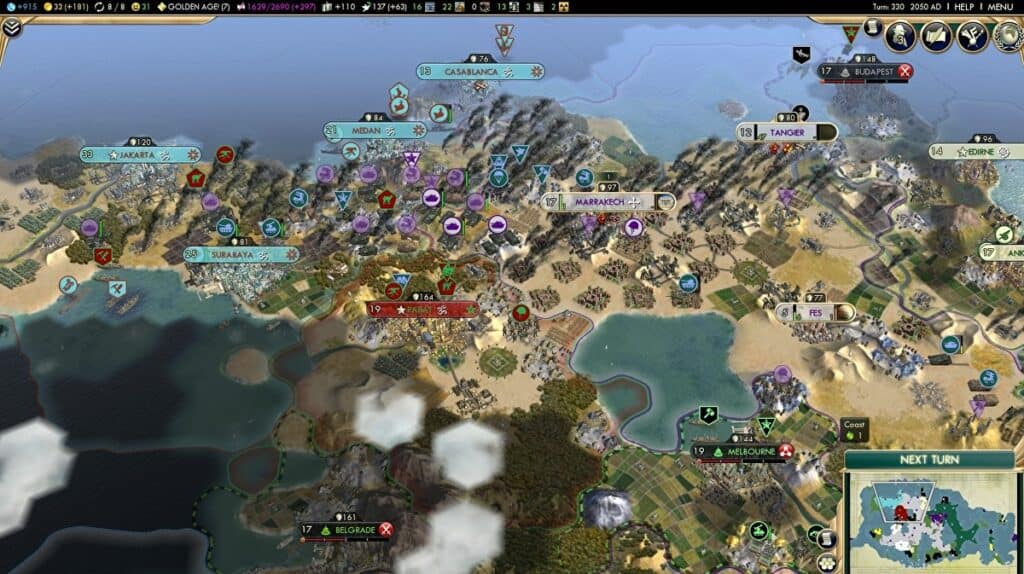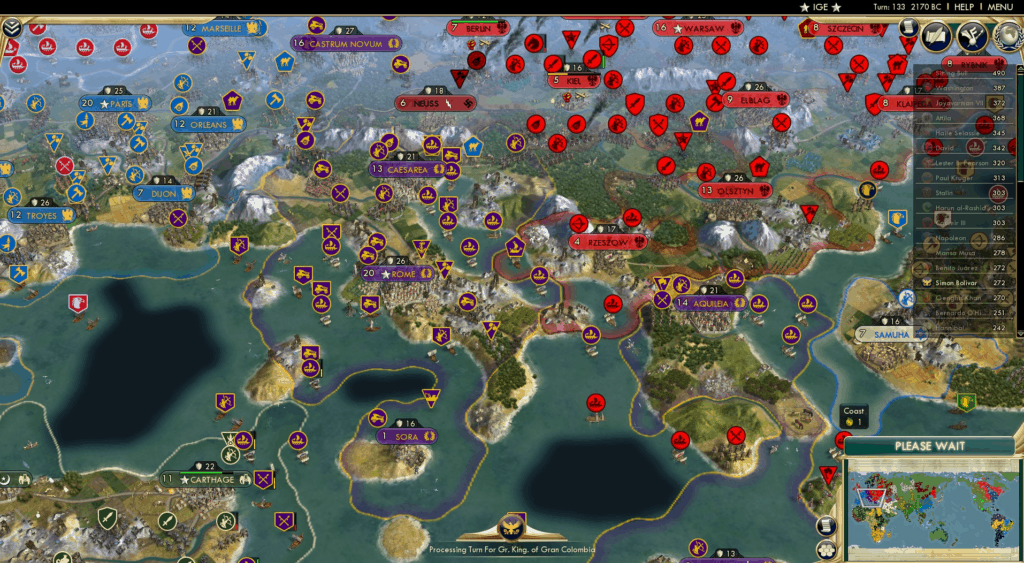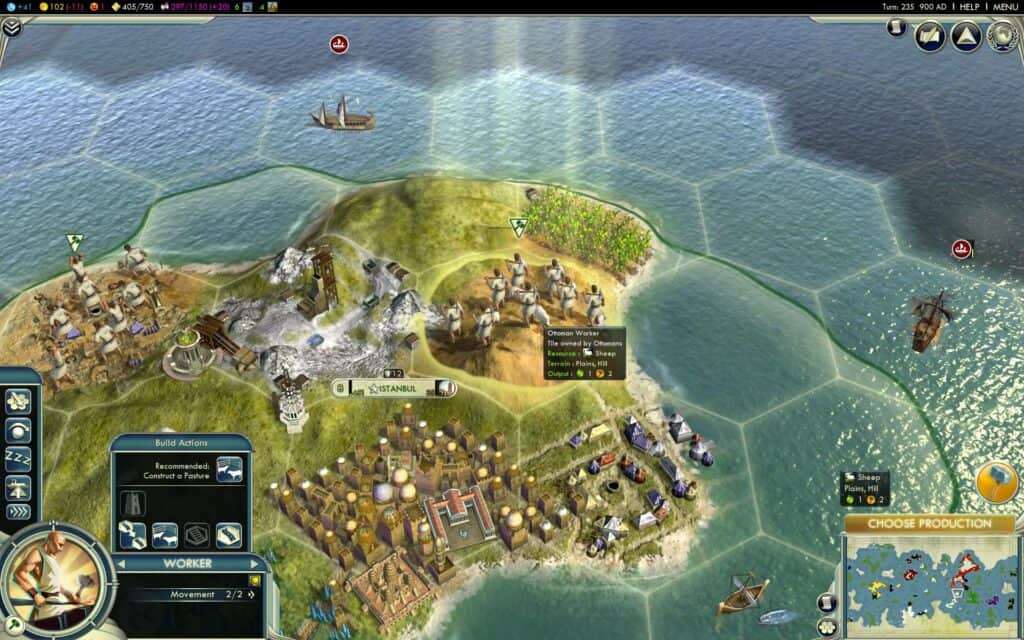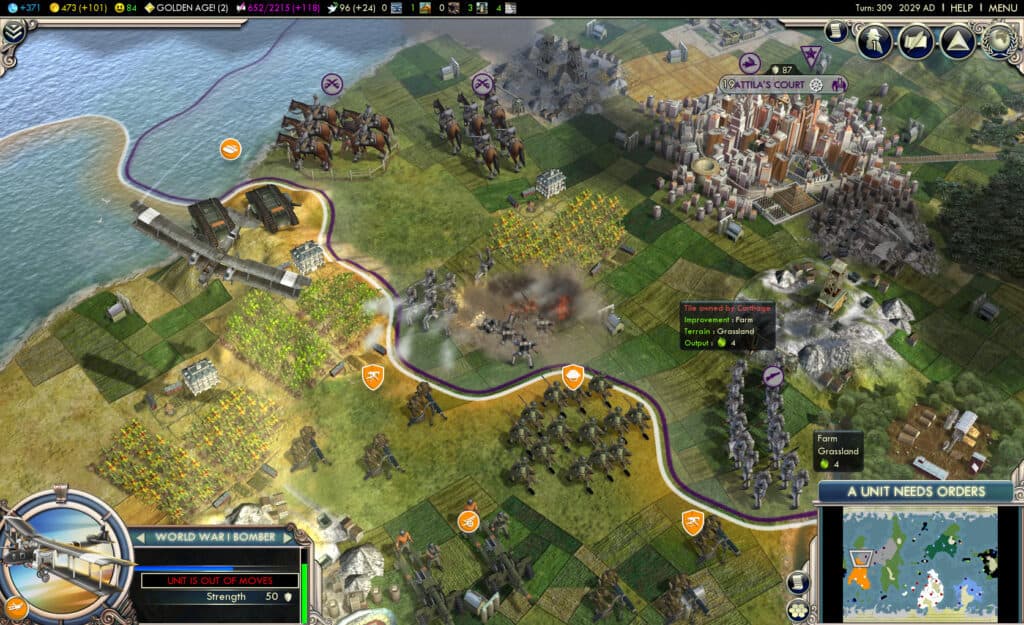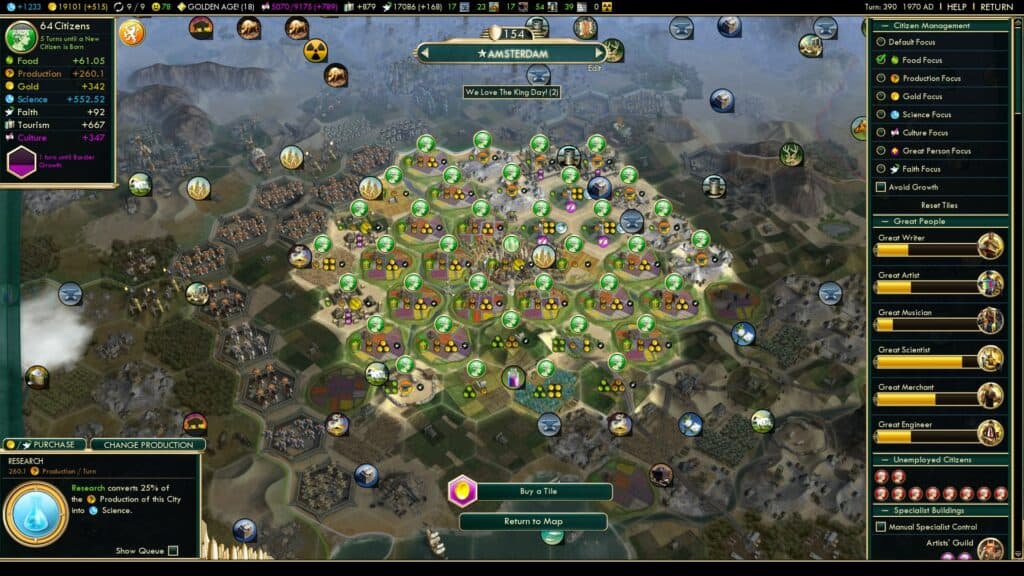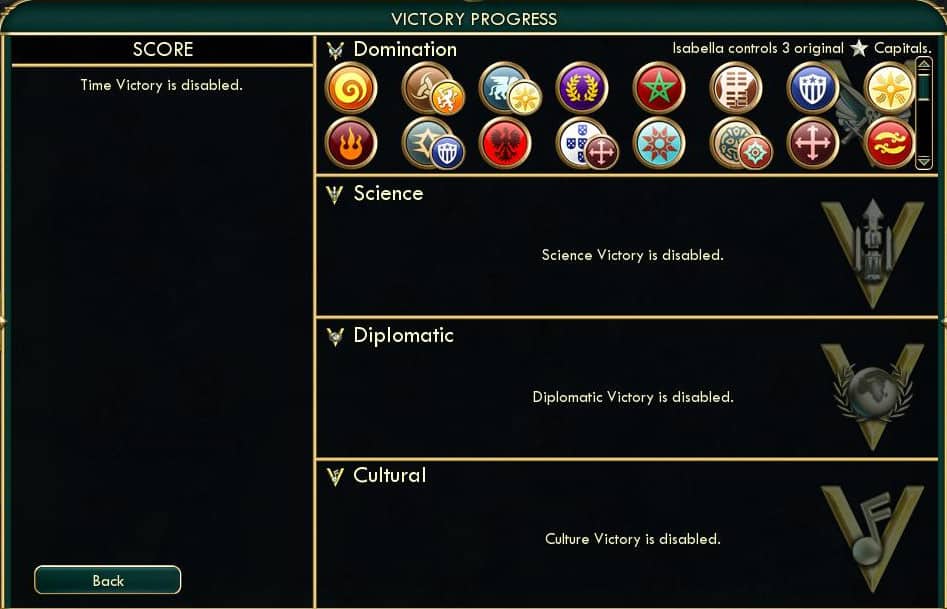- Civ 6 Countries Overview: How to Choose The Right Country? - August 7, 2021
- Civ 6 Tier List: Guide to the Best Civ 6 Leaders - July 6, 2021
- Civ 5 Tier List: Everything You Need to Know - May 23, 2021
Civilization V: Getting Started
Sid Meier’s Civilization V is the fifth turn-based strategy game released in Sid Meier’s Civilization series. The game was developed by Firaxis Games and published by 2k Games and Aspyre on September 21st, 2010.The game released two expansions packs and fourteen game add-ons during its lifetime.
Civ V won praise among critics and fans for its new engine system that allows players to build based on hexagonal tiles instead of square tiles. This is now the basis for every Civ game that will be released. Additionally, the combat and religion systems were overhauled and computer-controlled city-state and NPC’s were introduced into the game.
Gameplay
Civilization V’s gameplay is similar to that of its predecessors but with new and improved features. As a turned-based strategy game each player will represent civilization and during their turn will make decisions on how to grow and expand their civilization from a tiny village to a sprawling city.
These decisions will include how to manage military units, control production, and choose how the civilization wants to expand through technology, culture, food supply, and economics.
Difficulty Levels
Outside of choosing your civilization you also have the option to choose from a variety of different settings to customize your game experience. There are eight different difficulties. Settler is the easiest difficulty while Deity is the hardest difficulty. Higher difficulties will yield AI bonuses, such as free technology, defense units, worker units, and explore units.
Continue reading our full CIV 5 Units Guide.
Game Speeds
Game pace scales technology, production, and policy costs appropriately.
-
- Quick speed up the game by 40% and lasts 300 turns.
- Standard is the base speed and the game lasts for 500 turns.
- Epic is 50% longer lasting 750 turns.
- Marathon triples the cost of everything and lats for 1500 turns.
Game Maps
There are multiple kinds of maps that can be played in Civ V. Scenario games will use a premade map but other types of games allow the players to choose the type of map they want to play on. Many maps are modeled after various aspects of the Earth and its terrain while others are simply landmasses, islands, and oceans that don’t resemble anything specific.
Map Sizes
There are six different map sizes to choose from, each size accommodates a certain number of plays and has a certain number of city-states, natural wonders, and available active religions.
- Duel is perfect for two players and contains four city-states, 2 natural wonders, and 2 active religions.
- Tiny is perfect for four players and contains 8 city-states, 3 natural wonders, and 3 actives religions.
- Small is perfect for 6 players and contains 12 city-states, 3 natural wonders, and 4 active religions.
- Standard is perfect for eight players and contains 16 city-states, 4 natural wonders, and 5 maximum active religions.
- Large is perfect for 10 players, contains 20 city-states, 6 natural wonders, and 6 maximum active religions.
- Huge is perfect for 12 players, contains 24 city-states, 7 natural wonders, and 7 maximum active religions.
Civilizations
There are 43 total civilizations in Civ V. Eighteen of those civilizations came with the base game, seven were added through small addon packs, nine were added through the Gods&Kings expansion pack, and the Brave New World expansion pack.
A civilization is a specific historical nation with a leader based on history. Each civilization has four different things that are unique about them.
- Unique units: Each civilization has at least one, sometimes two unique units. These units replace a generic unit and are usually more effective during gameplay. They also possess a unique feature or ability, most of the time that unique feature will stay with them through upgrades.
- Gameplay Ability: Each civilization has a unique ability that provides bonuses. These abilities are geared towards victory conditions. If you want to play a specific strategy in the game choose a civilization whose ability lines up with that.
- Unique Buildings: Most civilizations come with a unique building or improvement that replaces the generic one. These buildings come with a special feature that gives a gameplay advantage.
- Starting Bias: Most civilizations favor a specific type of terrain or starting bias. If a civilization has a starting bias then that civilization will start near a specific type of terrain. This can be overridden for various reasons.
Eras
Eras are a period of time within a civilization. They mark a civilization’s technological progress. In order to advance to a new era, a player must either research all technologies within their current era or research one technology from the next era. There are seven eras in the base game.
- Ancient
- Classical
- Medieval
- Renaissance
- Industrial
- Modern
- Future
In Gods & Kings, the Future Era was replaced with the Atomic Era and Information Era.
Resources
Civ V contains three types of resources, strategic, luxury, and bonus resources. Resources are special commodities found within the map in limited quantities. When a resource is accessed they provide bonus points for your civilization. Resources can be accessed by constructing a specific improvement on that tile or sending a workboat for tiles that are at sea. When planning your civilization’s expansion, plan it so that you can control as many resources as possible.
Bonus resources are the most common and they provide tile yield benefits only. Strategic and luxury resources are much harder to come by but are much more valuable.
Bonus Resources
-
- Bananas
- Wheat
- Cattle
- Sheep
- Deer
- Fish
- Stone
- Bison
Strategic Resources
-
- Horses
- Coal
- Aluminum
- Iron
- Oil
- Uranium
Luxury Resources
-
- Cotton
- Spices
- Sugar
- Furs
- Ivory
- Silk
- Dyes
- Incense
- Wine
- Copper
- Gold
- Silver
- Marble
- Pearls Truffles
- Jewelry Porcelain
- Nutmeg
- Cloves
- Pepper
- Crab
- Salt
- Whales
- Citrus
- Cocoa
- Gems
City-States
City-states were a brand new feature in Civ V. They are small CIV 5 countries that usually contain only a single city and are AI-based. They also are not in competition with the players to win the game but they are competing against players to obtain resources.
Players can become friends with them, capture them or even ignore them. Befriending a city-state will allow you to gain diplomacy points and can be extremely helpful when attempting a diplomacy victory. Bullying a city-state will make them hostile to you and while they typically aren’t a threat they can ally with another civ and ask for protection. They also provide a small amount of firepower during the war when allied.
Units
There are 87 units in the game, they range from military to civilian. In Civ V players can only have one unit type for each tile. All units except for mounted units are able to move two tiles while mounted units can move up to four tiles each turn. Additionally, they are no longer destroyed but instead will incur damage when they lose a battle.
Other changes to units made in Civ V are the production and upkeep costs. It now takes longer to produce a new unit in the game and it also costs a lot more to maintain a unit. They also continue to increase the further you are in the game.
Terrain and Natural Wonders
Terrain or land in Civ V is an important feature. Different civilization prefers different terrains and will thrive in them. Additionally, the terrain can limit unit mobility, change combat and be subject to nuclear fallout from a nuke.
There are six different base terrains that determine its base properties. Other types of terrain, such as a forest or jungle. Resources also exist on top of a base terrain. This will modify the output of the tile but it will not change the base properties.
- Open Terrain is flat, level terrain that includes everything without a hill, forest, or jungle.
- Rough Terrain includes land that restricts free movement, such as, terrain with a hill, forest, or jungle.
- Lake Terrain is a body of water surrounded by a landmass and can consist of up to ten water tiles. If more than ten water tiles are enclosed then the body of water is considered an inner sea, not a lake.
- Coastal terrain is shallow waters that are typically located along the shoreline. Naval units can traverse coast tiles and obtain ocean resources.
- Ocean terrain is deeper waters that are farther from a landmass or island. These are harder to traverse requiring upgraded naval units.
- Fresh Water terrain refers to land tiles that border a lake, river, or oasis.
Natural wonders are unique terrain features that are created by Mother Nature. They provide players with culture, science, and faith bonuses, as well as provide an empire-wide happiness bonus when discovered. Lastly, they are impassable and cannot be improved or built upon. In total there are 17 natural wonders present within the game.
Buildings, Improvement, and Wonders
There are 71 buildings, 49 wonders, and 23 improvements including unique buildings in the game. Buildings and improvements are separated into different eras which require civilization to have advanced a specific amount for them to be built. Religious buildings are in a category of their own.
Wonders are mega buildings that can be unique to a world, they also provide high bonuses. Wonders are modeled after real-world buildings and landmarks. Wonders produce gold and faith bonuses as well as producing at least 1 culture point. They also will provide players with Great People points to attract a great person.
Improvements can be unlocked by discovering certain technologies. Once unlocked they are constructed outside of cities by workers. Improvements change the certain properties of a tile to add to potential tile yields. Improvements will remove forests and jungles, as well as, being susceptible to pillaging from enemies. When attacked the improvement will become inactive until it is repaired.
Social Policies
Social Policies are a new feature in Civ V and represent the non-scientific or religious advancements of your civilization. They are gameplay bonuses that are slowly activated as your civilization develops. Certain policies will only affect particular buildings, units, or Great People, while others will affect your civilization as a whole.
Policies are separated into different trees and depending on the game being played different policy trees will be available. The trees are separated into branches that require low-level policies to be adopted before higher-level policies. Each policy tree that is unlocked will give the player a special bonus, another bonus is awarded when a player has adopted all policies within the tree.
Technologies and Research
There are 74 technologies in Civ V and they are divided into seven different eras in the base game and nine different eras with the Gods & King expansion pack. When technology is researched it will unlock buildings, units, and other advancements. Some technologies are available in two different eras, for example, archaeology is available in both the renaissance and industrial eras.
Technology trading has been removed in Civ V and instead, civilizations can make research agreements as long as they are at peace with each other. This will provide both civilizations with a research boost after a set number of turns but only if the two civilizations remain at peace with each other. This can also be leveraged to make another civilization spend money before declaring war on them. This makes them an easier target with fewer resources to heal and produce an army.
Victory Conditions
There are five different victory conditions that a player can meet to achieve victory. Players only need to finish one victory track in order to win as long as they do it before anyone else.
- A Domination victory requires a player to be the last player in possession of their original capital. This means that another player cannot destroy your capital in order for you to win. You do not have to acquire other players’ capitals first, you can strategize so that you only need to acquire a few or one civilization’s capitals if they have captured others capitals.
- A Science victory requires you to build and launch a spaceship first. To do this players need to complete the Apollo Program project and be far enough in the technology tree that they can build the components of a spaceship. This requires a player to develop nearly every single technology tree in the game.
- A Cultural victory can be achieved by filling out five social policy trees in order the complete the Utopia Project. This requires a player to enact at least 25 social policies. The Brave New World DLC requires players to use tourism in order to obtain Cultural Domination instead of using social policies. This is a feature that is used in Civilization VI as well.
- A Diplomatic victory is achieved by winning the vote in the United Nations. IN order to do this players must become allies with the city-states in the game or give captures cities back to AI players. Additionally, a player that built the United Nations first is allowed two votes instead of just one. City-states vote if they are currently allied to civilization or have been liberated in the past. In the Brave New World DLC, the United Nations is developed naturally through the World Congress in the information era. Every 20 turns a new vote of The World Leader is held, the voting is similar to before.
- The last victory is simply by using time and allowing the game to choose winners based on a score. The player who has the highest score by the end of all turns is the winner. The score is based on a number of different things, it is also the only victory that can be disabled.
- The amount of Gold in the treasury.
- The number of resources a player has.
- The number of tiles in the civilizations border.
- The number of cities in the civilization.
- The population number.
- The number of social policies that have been adopted
- The number of technologies a player has.
- The number of future techs that have been researched.
- The number of wonders that have been constructed. This has the highest influence on the overall score.
Expansions & DLC
There are two expansion packs and fourteen different addons for the game with some addons purchasable in bundles.
The Gods and Kings expansion pack was released on June 19th, 2012. The expansion pack introduces a new religion system into the game. The new religious system provides new bonuses for civilizations and provides a new form of peaceful competition with different civilizations striving to be the dominant religion in the civilization. Unfortunately, the new system doesn’t lead to a victory but it is still very fun to play.
The Brave New World expansion pack was released on June 9th, 2013. The focus of the expansion pack was the bring new depths and replayability into the game. This is introduced through the new international trade feature that focuses on culture and diplomacy. Additionally, the expansion pack introduces an Ideology stem, World Congress, and the Archaeology tree.
DLC largely focuses on adding new civilizations or maps into the game.
- The Mongols were released on October 25, 2010.
- Babylon was released on October 25, 2010.
- Mediterranean, Asia, Americas, and Mesopotamia add ons were released on December 1st, 2010.
- Spain and Inca were released on December 16th, 2010.
- Polynesia was released on March 3rd, 2011.
- Denmark The Vikings and Explorer’s Map Pack was released on May 3rd, 2011.
- Korea and Wonders of the Ancient were released on August 11th, 2011.
- Scrambled Continents Map Pack was released on October 15th, 2013.
- Scrambled Nations Map Pack was released on November 5th, 2013.
FAQs
Answer:
The minimum requirements to run Civ V:
• OS: Windows® Vista SP2/ Windows® 7
• Processor: Intel Core 2 Duo 1.8 GHz or AMD Athlon X2 64 2.0 GHz
• Memory: 2GB RAM
• Graphics:256 MB ATI HD2600 XT or better, 256 MB nVidia 7900 GS or better, or Core i3 or better-integrated graphics
• DirectX®: DirectX® version 9.0c
• Hard Drive: 8 GB Free
• Sound: DirectX 9.0c-compatible sound card
• Note: Optimized for the touch-screen Ultrabook™ device
Recommended Requirements:
• OS: Windows® Vista SP2/ Windows® 7
• Processor: 1.8 GHz Quad Core CPU
• Memory: 4 GB RAM
• Graphics: 512 MB ATI 4800 series or better, 512 MB nVidia 9800 series or better
• DirectX®: DirectX® version 11
• Hard Drive: 8 GB Free
• Sound: DirectX 9.0c-compatible sound card
• Note: Optimized for the touch-screen Ultrabook™ device
Answer: Yes, mods are available for Civ V thanks to many of the settings regarding Units, and other features are stored in XML files while the gameplay logic is stored in Iua files. You can download mods from the Steam Workshop, Nexus Mods, and other mod sites. Remember to only download mods from trusted sites so you don’t get a virus.
Answer: This question is entirely subjective. If you enjoy Civ V chances are you will also enjoy Civ VI and vice versa. Civ VI builds considerably upon the foundation of Civ VI while improving on certain features or introducing new ones. Check out our Civ VI page here to see the changes and improvements.
Final Thoughts
Civ V brings a new fresh look to Sid Meier’s Civilization series. With hexagonal tiles that allow for better-planned expansion, a new religion system, and a new social policy system this title has set the bar for future Civilization titles. The game has received universal critical acclaim and has been tagged a must-play game.
Continue reading related CIV 5 Guides


